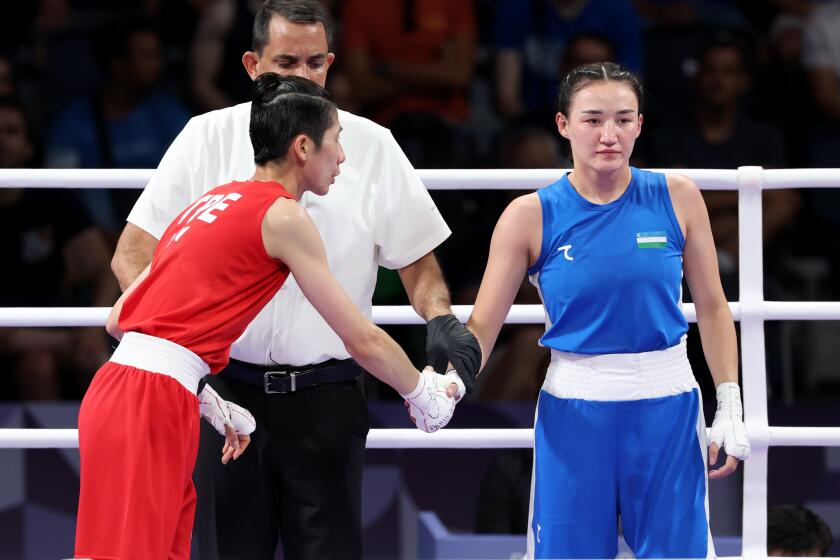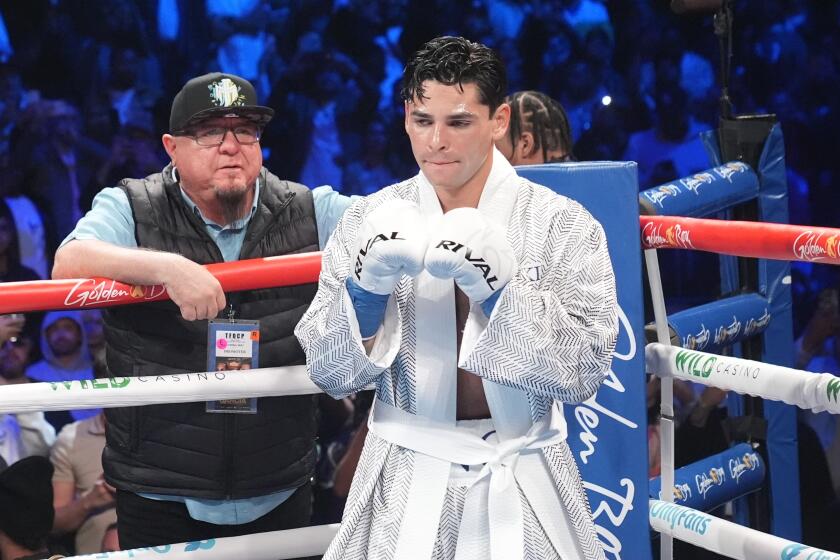South El Monte’s Boxing Program Down for Count
SOUTH EL MONTE — Andres Meza is one reason supporters of a recently canceled city youth boxing program hope there are a few more rounds left in their match with the City Council.
After moving from Mexico six years ago when he was 14, Meza was reluctant to join his friends who belonged to the program because he did not like the sport.
“I just went one time and they started training me,” said Meza, who quickly advanced from novice to champion. “They didn’t ignore me. That was my first day there and they didn’t ignore me.”
Before turning professional last year, Meza won 65 fights and lost only four. In the process he won several local and state titles and the 1984 Amateur Boxing Federation national bantamweight championship.
Undefeated Pro
Since turning pro, Meza has won all three of his fights, two by knockouts.
But like the dozens of others who participated in the city program, Meza is looking for another place to train and points to the positive influence the program has had on his life.
“It helped me by (making me) behave myself, not getting into guns and not getting into trouble,” Meza said.
The City Council voted last July to stop funding the program as of Dec. 31 because the city could no longer afford the $67,000 annual cost. Mayor Albert Perez pointed to the loss of more than $500,000 in federal revenue-sharing money, the rise in insurance premiums for the city and increased costs of the police department as reasons the city no longer could finance the program.
No Private Financing
Perez said the city has been unable to obtain private financing for the program, which teaches young people between the ages of 7 and 17 how to box.
When Edward Fierro, the program’s director, went to work on Dec. 12 at the gym, he found the locks on the doors had been changed.
Since then, Fierro and two part-time coaches have lost their jobs and the 40 or so youngsters who used the gym each day to learn the sport have had no place to practice.
About 25 people have been trying to persuade the city to restart the program or take a more active role in trying to save it.
The Committee to Save the South El Monte Youth Boxing Program, which is seeking $63,000 in donations to keep the program alive for another year, plans to ask the council tonight to allow the city to administer the program if private funding can be obtained.
Seeking Commitment
Members hope that such a commitment could be stated in an endorsement letter that would be used to raise funds.
City Manager Raul Romero said the city is trying to find a way to help the committee and will discuss possible solutions at tonight’s meeting.
Indications that the city might have to drop the 9-year-old program have been evident for the last few years, Perez said.
“We indicated that the program was not self-sufficient, was costing too much money,” Perez said. “All the people in the boxing program knew.”
Still, the mayor said, “we always managed to come up with some additional funding, rob Peter to pay Paul. This last year, we just couldn’t do it.”
No Donations
Perez said the city tried to raise money from businessmen and residents to save the program but received no donations.
The $67,000 paid salaries for the director and two coaches, rent for the gymnasium and the cost of utilities and supplies.
The program started in 1978, when city officials asked Fierro, who was working as director of a similar boxing program in Montebello, to start a program in South El Monte as a way to get youngsters off the streets.
Besides teaching youngsters how to jab and dodge a punch, Fierro said he stressed the importance of staying away from drugs and staying in school. He repeatedly asked program participants about their classes and grades and was in contact with school officials, he said.
“The kids that came to my gym were clean-cut, and if they weren’t, I would grind on them and eventually turn a bad kid into a good kid,” Fierro said. “Some didn’t want to become boxers, but they wanted to belong.”
Not Informed
Fierro said he had not been told that the gymnasium would be locked on Dec. 12.
“The kids were there, asking me what happened when I couldn’t get into the gym,” said Fierro, a former professional welterweight boxer. “I told the kids we’re going to try to do something and open another gym for them. What else could I say?”
Fierro said he is angered that as the boxing program’s director, he was not given notice of the gym’s closure. He said he assumed the gym would be open to the youngsters until Dec. 31, when funding ran out.
“(Being locked out) was a traumatic experience,” Fierro said. “They dealt with me as if I was some kind of burglar, after all these years of service.”
He said he was later allowed into the building--with an escort from the city--to retrieve some of his belongings.
No Time
Mayor Perez said there was no time to tell Fierro when the locks would be changed and the gym closed because the gym’s landlord was eager to begin improvements and feared that too many people had access to the building.
Those trying to save the program contend that the city did not try hard enough to find private funding.
Rachel Marquez, the committee’s spokeswoman, also faulted the wording of a brochure the city used in its efforts to find private support. One paragraph in the brochure states:
“The kids in this program are generally those outside of society’s mainstream, who participate little in city, school, or other organized youth activities. . . . They are street toughs, the gang kids, school drop-outs, kids on dope, who pack guns and fill our juvenile jails.”
The brochure was “written to make people believe that the only kids who participated in the program were hoodlums, dropouts and dopers,” which is not true, Marquez said. “There are a lot of nice kids in the program.
No Rewards
“Businessmen do not reward kids for being bad. They don’t give money to reward bad kids.”
Marquez, a Pico Rivera resident, was asked to join the committee because of her knowledge of fund-raising. Marquez works for the state Department of Employment Opportunity and monitors state grants given to community action agencies.
Richard Brennan pointed to what the program has done for his 9-year-old son as his reason for joining the committee.
“His schoolwork improved and his confidence has improved,” Brennan said. “They build character in that place. They help people.”
A young professional boxer who got his start in the program concurs.
“It really gave me something to do,” said Efren Chavez, 20, who turned professional last year after winning several amateur titles in the bantamweight class. “It kept me from hanging out with my friends, being out on the street.”
Chavez said he feels “bad for the kids that just started. Now, they’re going to turn somewhere else. They’re going to have to turn to a gym far away or do nothing.”
More to Read
Go beyond the scoreboard
Get the latest on L.A.'s teams in the daily Sports Report newsletter.
You may occasionally receive promotional content from the Los Angeles Times.










